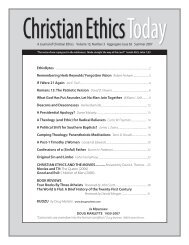Issue 052 PDF Version - Christian Ethics Today
Issue 052 PDF Version - Christian Ethics Today
Issue 052 PDF Version - Christian Ethics Today
You also want an ePaper? Increase the reach of your titles
YUMPU automatically turns print PDFs into web optimized ePapers that Google loves.
Ethical <strong>Issue</strong>s in Human Resource Management<br />
Alarge area of human relations management is concerned<br />
with various ethical issues, both on the part of<br />
upper–level management in its business decisions and<br />
lower–level management in the treatment of individual<br />
employees. Philosophic decisions on the relocation of areas<br />
of production or entire plants can have a major impact on<br />
the company but also can be devastating to individual<br />
employees and the communities in which they live.<br />
Management decisions must be made honestly taking all factors<br />
into consideration, including social responsibility as well<br />
as stockholder concerns. On a lower level, supervisors must,<br />
if they are to retain any esprit de corps within their unit of the<br />
organization, treat those they supervise fairly in matters of<br />
promotion and compensation.<br />
Below are three situations that illustrate a few of the ethical<br />
challenges that may arise in human resource management.<br />
Each is analyzed as to the appropriate ethical response<br />
to each situation, including suggested methods of approach<br />
that would be appropriate for the <strong>Christian</strong> businessperson.<br />
Initially it is appropriate to define the term “ethics” as<br />
used in this paper. The American Heritage Dictionary<br />
defines “ethics” as: (1) A set of principles of right conduct. A<br />
theory or a system of moral values. (2) The study of the general<br />
nature of morals and of the specific moral choices to be<br />
made by a person; moral philosophy. (3) The rules or standards<br />
governing the conduct of a person or the members of a<br />
profession. 1<br />
In secular human resource management, generally ethics<br />
is treated as being relative, i.e. whether an action is moral or<br />
immoral, or right or wrong depends on the prevailing view of<br />
the particular individual human resource manager. Such view<br />
is certainly molded by the culture. A human resource manager<br />
may well consider decisions to be ethical if all consequences<br />
are considered in the light of business needs<br />
balanced with consequences to all concerned, including the<br />
employees.<br />
In making decisions the human resource manager should<br />
consider alternative solutions to the needs of the business as<br />
well as the effects the decisions will have on the lives of the<br />
employees. Frequently a human resource manager will be<br />
given instructions from higher level management to take<br />
action which will be oppressive to the employees and the<br />
manager must either present arguments to higher management<br />
for alternate solutions which will have less impact on<br />
the employee morale or determine the best method for<br />
implementing the instructions which have been given.<br />
18 • CHRISTMAS 2004 • CHRISTIAN ETHICS TODAY<br />
By Burton H. Patterson,<br />
Southlake, TX<br />
Is not “ethics” a set of principles ordained by God for the<br />
governance of the affairs of his creation? If so should not that<br />
set of principles be applicable to business affairs the same as<br />
to all other human affairs. 2 This is the position reached by<br />
Dr. Leon McBeth in a message in which after he quoted from<br />
the 1963 version of the Baptist Faith and Message: “Every<br />
<strong>Christian</strong> should seek to bring industry, government, and<br />
society as a whole under the sway of the principles of righteousness,<br />
truth and brotherly love.” He concludes that<br />
<strong>Christian</strong> ethics are relevant to the workaday world. 3<br />
A similar comment was made by Dr. Joe Coleman: “Jesus<br />
Christ came into this kind of world and when he came, he<br />
came to penetrate society. . . . We are to permeate and penetrate<br />
society. This says to me this morning that the ethical<br />
approach to my profession is that I as a child of God must<br />
penetrate the society in which I live and enlighten it. . . .” 4<br />
The Bible is the basis for determining a <strong>Christian</strong> way of<br />
life. A <strong>Christian</strong> must walk with the ethical conduct taught<br />
in scripture. Jesus taught honesty. Thus a <strong>Christian</strong> businessperson<br />
must be honest. Honesty is not the best policy—<br />
it is the only policy—there are no options. Jesus taught his<br />
followers how to handle conflict with truthfulness and<br />
integrity. Following his example, the <strong>Christian</strong> businessperson<br />
must love even those who would take advantage or even<br />
sabotage a business.<br />
Business ought to conform to the best ethical practices,<br />
not just for a religious reason or for principles of human dignity,<br />
but also to keep from violating federal laws. Though the<br />
laws may not be known, they would not be violated if the<br />
business were operated by ethical principles. Experience has<br />
shown that in the long term business profits will be greater<br />
for businesses that practice good ethical behavior than those<br />
which do not. 5<br />
As an interesting contrast, at least one leading cleric does<br />
not believe the flip side to be true. Eric Kemp, Bishop of<br />
Chichester at Canterbury, noted that while ethical management<br />
in the business world was not necessarily alien to the<br />
world of the church, it really did not work in a church setting.<br />
His reasoning was that secular business viewed humans<br />
in terms of their market value and treated them ethically solely<br />
for business purposes which was too ruthless for church<br />
management. 6<br />
One of the most challenging aspects of human relations<br />
management is to maintain objectivity in hiring, promotion,<br />
and compensation. For example, a male supervisor must<br />
refrain from promoting or increasing the compensation of an












